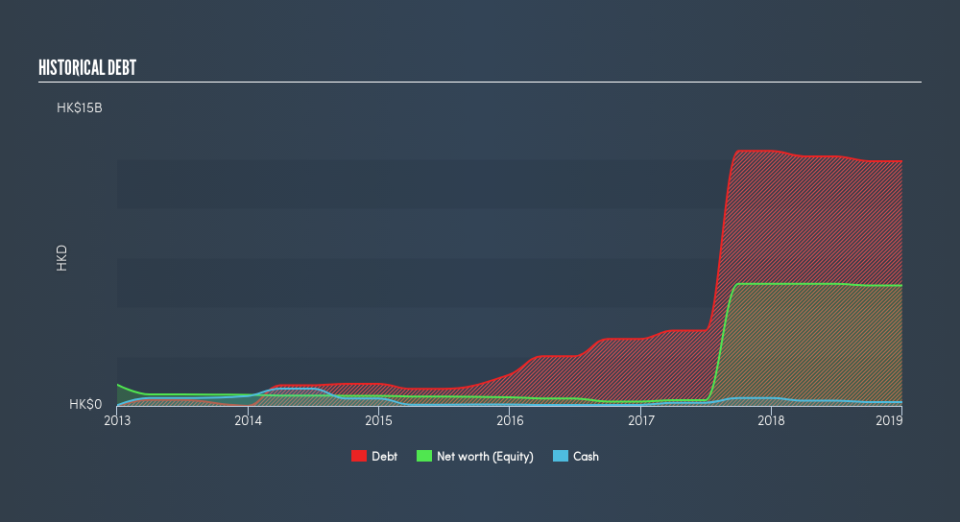These 4 Measures Indicate That Lerthai Group (HKG:112) Is Using Debt Extensively

David Iben put it well when he said, 'Volatility is not a risk we care about. What we care about is avoiding the permanent loss of capital.' So it seems the smart money knows that debt - which is usually involved in bankruptcies - is a very important factor, when you assess how risky a company is. Importantly, Lerthai Group Limited (HKG:112) does carry debt. But is this debt a concern to shareholders?
Why Does Debt Bring Risk?
Debt assists a business until the business has trouble paying it off, either with new capital or with free cash flow. Ultimately, if the company can't fulfill its legal obligations to repay debt, shareholders could walk away with nothing. However, a more common (but still painful) scenario is that it has to raise new equity capital at a low price, thus permanently diluting shareholders. Of course, debt can be an important tool in businesses, particularly capital heavy businesses. The first step when considering a company's debt levels is to consider its cash and debt together.
View our latest analysis for Lerthai Group
What Is Lerthai Group's Debt?
As you can see below, Lerthai Group had HK$12.4b of debt at December 2018, down from HK$12.9b a year prior. And it doesn't have much cash, so its net debt is about the same.
A Look At Lerthai Group's Liabilities
According to the last reported balance sheet, Lerthai Group had liabilities of HK$7.64b due within 12 months, and liabilities of HK$12.9b due beyond 12 months. Offsetting this, it had HK$188.2m in cash and HK$185.3m in receivables that were due within 12 months. So its liabilities outweigh the sum of its cash and (near-term) receivables by HK$20.2b.
This deficit casts a shadow over the HK$5.44b company, like a colossus towering over mere mortals. So we'd watch its balance sheet closely, without a doubt At the end of the day, Lerthai Group would probably need a major re-capitalization if its creditors were to demand repayment.
In order to size up a company's debt relative to its earnings, we calculate its net debt divided by its earnings before interest, tax, depreciation, and amortization (EBITDA) and its earnings before interest and tax (EBIT) divided by its interest expense (its interest cover). The advantage of this approach is that we take into account both the absolute quantum of debt (with net debt to EBITDA) and the actual interest expenses associated with that debt (with its interest cover ratio).
Lerthai Group shareholders face the double whammy of a high net debt to EBITDA ratio (30.7), and fairly weak interest coverage, since EBIT is just 0.54 times the interest expense. This means we'd consider it to have a heavy debt load. Notably, Lerthai Group's EBIT was pretty flat over the last year, which isn't ideal given the debt load. When analysing debt levels, the balance sheet is the obvious place to start. But it is Lerthai Group's earnings that will influence how the balance sheet holds up in the future. So when considering debt, it's definitely worth looking at the earnings trend. Click here for an interactive snapshot.
Finally, while the tax-man may adore accounting profits, lenders only accept cold hard cash. So the logical step is to look at the proportion of that EBIT that is matched by actual free cash flow. Over the last two years, Lerthai Group actually produced more free cash flow than EBIT. There's nothing better than incoming cash when it comes to staying in your lenders' good graces.
Our View
To be frank both Lerthai Group's interest cover and its track record of staying on top of its total liabilities make us rather uncomfortable with its debt levels. But at least it's pretty decent at converting EBIT to free cash flow; that's encouraging. Overall, it seems to us that Lerthai Group's balance sheet is really quite a risk to the business. For this reason we're pretty cautious about the stock, and we think shareholders should keep a close eye on its liquidity. Given our hesitation about the stock, it would be good to know if Lerthai Group insiders have sold any shares recently. You click here to find out if insiders have sold recently.
If you're interested in investing in businesses that can grow profits without the burden of debt, then check out this free list of growing businesses that have net cash on the balance sheet.
We aim to bring you long-term focused research analysis driven by fundamental data. Note that our analysis may not factor in the latest price-sensitive company announcements or qualitative material.
If you spot an error that warrants correction, please contact the editor at editorial-team@simplywallst.com. This article by Simply Wall St is general in nature. It does not constitute a recommendation to buy or sell any stock, and does not take account of your objectives, or your financial situation. Simply Wall St has no position in the stocks mentioned. Thank you for reading.

